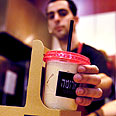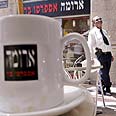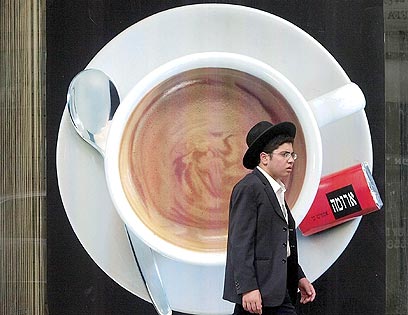
'Welcome to Aroma'
Photo: Chen Mika

Same coffee, American milk
Photo: Sebastian Scheiner
Israeli coffee chain coming to NY
They turned the pampering-Burekas into 'Treat Bureka' and changed the name of the Iraqi sandwich due to political considerations. Yedioth Ahronoth magazine reporter visited Aroma just before the opening of the first branch in New York, and checked whether the coffee shop chain from Jerusalem has any chance of hitting Starbucks on its own turf
“Welcome to Aroma. Would you like to order the ‘Grilled Vegetable Mediterranean’ Sandwich or would you prefer the local ‘Treat Bureka’? ” These will be, more or less, the greeting words you will hear the next time you visit New York and are looking for something to eat that reminds you of home. Nonetheless, you will have to brush up on your English. Not only has the coffee shop chain changed part of its menu to make it agreeable to American taste buds, but it has also joined the politically correct parade when it comes to sandwich names. You’ll no longer find an Iraqi sandwich, but rather a grilled vegetable Mediterranean one.
The first branch of the Aroma chain outside Israel will open at the posh Soho area, on Houston Street, which is considered to be one of the most central and busiest streets in Manhattan. Last week, Hanoch Milevitski, manager of the New York branch, was still standing over a puddle of white paint that covered the floor, as he commanded the construction work at the huge coffee shop, which will extend over an area of 650 squared meters.

Aroma in hometown Jerusalem. Aiming for Big Apple (Photo: AP)
Within four years, the owners of Aroma hope to repeat its Israeli success, and dot the map of the US with dozens of coffee shops, to operate by franchise. In order to alleviate the bureaucratic procedures, Aroma – USA, controlled by Yariv Shefa, was established as a subsidiary of Aroma – Israel. In two-month time another branch will open in Toronto, Canada, and during the following year branches are expected to open also in California and Florida.
Competing with Starbucks
For the past four years, the owners of Aroma have conducted market research, taste tests and financial research to try and predict the chain’s integration in the American market and get it running with minimal mistakes. Ernst & Young was hired for the mission and began developing a strategy for local activity.
“We have examined not only the American coffee market, but also the drinking habits of the average American and the changes that have taken place in the consumption habits since Starbucks became the leading chain in the market,” says Milevitski. “We discovered that whereas once the average American was willing to pay a buck for a coffee cup, today he does not hesitate to spend four dollars on a cup of coffee, after Starbucks has educated him to do so.”
Mentioning Starbucks in one breadth with Aroma is not a new thing for the managers of the chain. Even before the first cappuccino was made with foam at the branch, there is talk in Aroma about the desire to grow, develop and give an appropriate answer to the huge Starbucks chain. The goal is to open 40 branches that will join the 72 Israeli branches in a few years.
The huge financial investment may turn the coffee shop tables around, should the American Aroma turn out to be a failure. The total investment in opening the first branch amounts to USD 1.6 million. The coveted location had its price, and the partners paid yearly rental fees of USD 300,000 for the flagship shop.
No Hebrew menu
The visit to New York branch will be similar in many respects to a visit to an Aroma branch in Israel. The decoration of the branch is a crossbreeding of the chain’s original design in Israel with some New York style touches. The dominant colors are red-black-white, and the coffee shop’s space is decorated like a red spaceship with a rounded ceiling, red bricks and round chairs.
The target audience, at least during the early stages, is Israelis living in New York that are familiar with the taste of the Iraqi sandwich. “We realize that during the first few weeks we will rely on Israelis that are familiar with Aroma and this will remind them of home,” says Milevitski. “But in the long run, we are counting on the American crowds. Aroma will not be an Israeli coffee shop in New York. We don’t have a menu in Hebrew, we will not have newspapers from Israel, and we will not showcase the local Israeli channel on the television screen.”
Will you downplay your Israeli origins?
“No, Israelis that know us from Israel are aware that we are Israeli, and the Americans will likely think of us as a coffee shop with a Mediterranean flavor. We appeal to an especially diverse common denominator, and we would like everyone to come drink coffee at the shop, even couples that are out on a date and the guy who just came out of the gym.”
The coffee will be identical to the one sold in Israel, but what about the food section? The Iraqi Sandwich was turned into a grilled vegetable sandwich in a Mediterranean style, so as not to remind the Americans of any blood-drenched battle, God forbid. The Tunisian Sandwich will remain in Israel, after Waldy Melitz, the chain’s food consultant in the US, estimated that it will not survive the relocation to New York. The herbs underwent a slight change. The local milk underwent many tests to ensure that it is appropriate for Aroma’s type of coffee. And the salad section has been strengthened by a significant local player, better known as the popular Caesar’s Salad. Even the familiar Israeli breakfast will step aside and be replaced by a lighter breakfast.
Culinary dilemmas
The managers of the chain had to tackle another culinary dilemma: whether to introduce pork meat into the menu or to maintain its Kosher Israeli essence. First, it was decided to include a ham and cheese sandwich, considered one of the preferred sandwiches by Americans. Later, the chain managers realized that “selling pork is going one step too far,” according to Milevitski.
Slight changes will also take place at the customer service section. The tiresome “What would you like to order?” repeated by the cashiers in Israel will be replaced by the glowing eyes of local employees (USD 9 per hour) who will say “Welcome to Aroma”. This was decided after the chain managers realized that a literal translation to English might be misinterpreted.
“We had to work hard on the customer service, what to say and what not to say. An American, for example, might react in shock when his name is announced over the speakers. It is viewed as an invasion of their privacy. When the customer receives the tray, we cannot say ‘Have a nice day’, because in New York that sounds like ‘Get outta here’. On the other hand, if the branches in Israel were to greet customers with the phrase ‘Welcome to Aroma’, everyone would laugh to our face’.”
Judging by the reasonable prices, Aroma will compete well with its competitors’ pricing policies: USD 3 for a cup of coffee, USD 5-11 per sandwich, USD 4 for a Burekas, and USD 9 for a salad bowl. In the not-so-distant future, the chain will have to compete with some Israeli coffee shop chains that are eyeing the West.
Will we be witnessing a civil war in the coffee sector any time soon?
“I am not afraid of competition,” says Milevitski. “As long as there will be more Israeli coffee here, so will the familiarity with this type of coffee grow. Café Hillel has a chance of penetrating the market, but it will be hard to market Arcaffe as Israeli coffee. In any case, the success of Israeli companies will please us and challenge us at the same time. Competition between Israeli coffee shop chains in New York will be truly be ‘apocalypse now’.”















